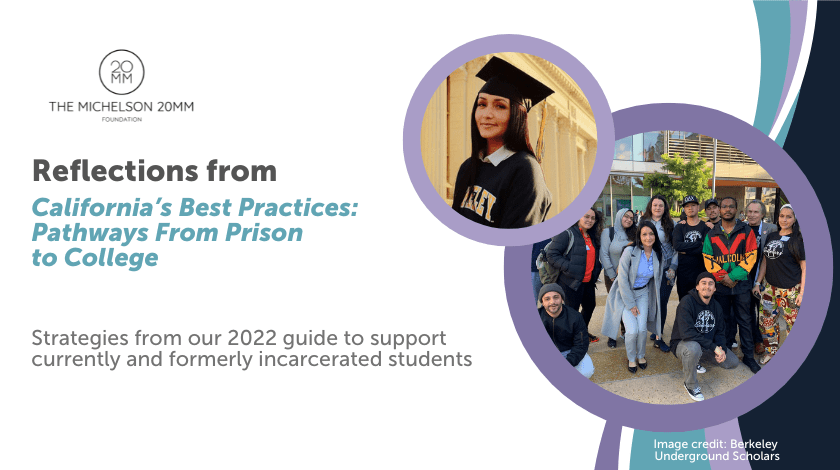By Kenia Miranda Verdugo
Education has the power to transform lives and provide opportunities for individuals to thrive, irrespective of their past. In recent years, a growing recognition of the importance of higher education for incarcerated and reentering individuals has culminated in the development of the Smart Justice Think Tank, who then created California’s Best Practices: Pathways from Prison to College, a comprehensive resource that lays out detailed strategies to support currently and formerly incarcerated students.
Michelson 20MM brought this resource to life with a virtual learning series that highlighted each population the Best Practices aim to support: currently incarcerated students, students transitioning from prison to campus, and students enrolled on campus who were previously incarcerated. Over the course of four webinars, we convened practitioners, advocates, faculty, and system-impacted individuals who shared their unique perspectives and lived experiences. As we reflect on the series and look ahead, we will highlight a few of the Best Practices and how they can improve the lives of justice-impacted individuals.
In-Person Education Behind Bars
Dedicated classroom spaces within prisons provide incarcerated students with a conducive learning environment, which fosters academic growth and personal development. Additionally, distinct living quarters for incarcerated students create a sense of stability, enabling them to focus on their education without the distractions of the general prison population.
Accessible Technology and Academic Support
Access to technology and educational resources, such as devices, online libraries, and research platforms like JSTOR open doors to a wealth of knowledge for incarcerated students. By embracing technology and having support in place to learn the technology, students can enhance their learning experience and broaden their horizons. Furthermore, offering resume-building workshops and leadership development training equips them with the skills necessary for successful reentry into society.
Inclusivity and Support Services
Recognizing the unique challenges faced by specific populations, such as women and LGBTQI+ individuals, is another vital aspect. Tailoring educational programs and support services to meet their specific needs ensures inclusivity and equal opportunities for all. Additionally, facilitating access to transitional planning, academic career advising, and transferable degree pathways helps incarcerated students navigate the complex process of transferring to four-year universities.
Community Integration
Supporting individuals during their transition from incarceration back into their communities is critical for successful reentries. Participating in on-campus programs and community-based organizations that assist with reentry and matriculation processes provides a solid foundation for continued growth. Additionally, offering assistance to transfer an individual’s parole to different counties that better facilitate their education while also providing access to personal documents, such as identification and social security cards, eases administrative burdens and facilitates smoother transitions.
Financial Aid and Housing
Financial aid services, including awareness of available options and assistance with applications and loans, are essential for incarcerated and reentering individuals pursuing higher education. Furthermore, affordable on-campus housing options help alleviate financial strains and provide a supportive living environment.
Comprehensive Support Services
Creating a network of support is crucial for individuals seeking to rebuild their lives. Connecting them with community resources—legal assistance, expungement guidance, and information on licensing barriers—fosters reintegration into society. Additionally, access to mental health services, food pantries, computer literacy training, and child care resources ensures holistic support for their personal and academic success.
Looking Ahead: California’s Best Practices in Action
By implementing these Best Practices, higher educational institutions can play a pivotal role in empowering incarcerated and reentering individuals to overcome obstacles and realize their full potential. By breaking down barriers and providing comprehensive support, we can create a society that values education, second chances, and the limitless potential of every individual, regardless of their past.
Many organizations are tirelessly working to improve the lives of currently and formerly incarcerated students. Inspired by their work, we are excited to introduce the next phase of our virtual learning series Pathways From Prison to College: California’s Best Practices in Action. This series will spotlight organizations bringing the Best Practices guide to life and highlight how others can also participate in the movement to support ALL students.
Michelson 20MM is a private, nonprofit foundation working toward equity for underserved and historically underrepresented communities by expanding access to educational and employment opportunities, increasing affordability of educational programs, and ensuring the necessary supports are in place for individuals to thrive. To do so, we work in the following verticals: Digital Equity, Intellectual Property, Smart Justice, Student Basic Needs, and Open Educational Resources (OER). Co-chaired and funded by Alya and Gary Michelson, Michelson 20MM is part of the Michelson Philanthropies network of foundations.
To sign up for our newsletter, click here.
